13 june 2016
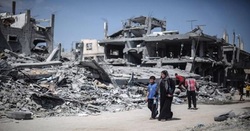
The United Nations Office for the Coordination of Humanitarian Affairs (OCHA) said, in its annual report titled Fragmented Lives: Humanitarian Overview 2015, that an estimated 90,000 Palestinians are still displaced in Gaza largely due to Israel’s 2014 aggression.
The report said that the suffering of Gaza population resulting from the 2014 hostilities - with close to 90,000 Palestinians still displaced during the second half of 2015 - was compounded by the Israeli blockade, the almost continuous closure of the Rafah passenger crossing by Egypt, and by internal Palestinian divisions.
Although no major displacement occurred in Gaza in 2015, internally displaced persons (IDPs) in the Gaza Strip continue to suffer from the devastating consequences of the 2014 hostilities between Israel and Palestinian armed groups with an estimated 90,000 people still displaced during the second half of 2015.
Meanwhile, the report noted that the number of Palestinian structures demolished, or dismantled and confiscated by the Israeli authorities across the West Bank sharply increased in the first four months of 2016, surpassing the figures for all of 2015 (598 vs. 548).
Overall, 858 Palestinians, around half of them children (416), were displaced, compared to 787 people in the whole 2015.
In the Gaza Strip, the reconstruction and repair of homes destroyed and damaged during the 2014 hostilities continued during the first quarter of 2016.
However, “Obstacles on the entry into Gaza of the enormous amounts of construction materials needed for the repair and reconstruction of homes has been a major challenge.” Israeli settlements, which have been established and expanded in the occupied West Bank, including occupied Jerusalem, in contravention of international law, underlie many of the concerns highlighted in this report and generate the need for assistance and protection measures by humanitarian actors.
The report stated that Palestinian civilians continued to be subjected to threats to their lives, physical safety and liberty from conflict-related violence, and from policies and practices related to the Israeli occupation, including settler violence.
While most of 2015 witnessed a relative calm compared to 2014, tension rose in September in occupied Jerusalem, with protests, clashes and violence spreading to the remaining oPt, including to the Access Restricted Areas (ARA) in Gaza in October.
Due to the upsurge in violence in the last quarter, 2015 recorded the highest number of casualties among West Bank Palestinians since 2005. In Gaza, the August 2014 ceasefire has largely held, as reflected in the relatively low number of fatalities, although casualties also rose in the final quarter of the year, along with the escalation in the West Bank.
As of the end of 2015 there were over 6,000 Palestinians held by the Israeli Prison Service on ‘security’ grounds, the highest such figure since 2010. The number of children among them, 422, was also the highest since August 2008, when this indicator began to be tracked, including six held in administrative detention, without charge.
Some 80 per cent of the Palestinian children imprisoned were in pre-trial detention, the majority facing stone-throwing charges. These conditions continued to cause a protracted protection crisis with humanitarian consequences, where Palestinians face a range of threats that undermine their ability to live self-sustaining lives and prevent the enjoyment of their rights, including the right to self-determination.
The report said that the suffering of Gaza population resulting from the 2014 hostilities - with close to 90,000 Palestinians still displaced during the second half of 2015 - was compounded by the Israeli blockade, the almost continuous closure of the Rafah passenger crossing by Egypt, and by internal Palestinian divisions.
Although no major displacement occurred in Gaza in 2015, internally displaced persons (IDPs) in the Gaza Strip continue to suffer from the devastating consequences of the 2014 hostilities between Israel and Palestinian armed groups with an estimated 90,000 people still displaced during the second half of 2015.
Meanwhile, the report noted that the number of Palestinian structures demolished, or dismantled and confiscated by the Israeli authorities across the West Bank sharply increased in the first four months of 2016, surpassing the figures for all of 2015 (598 vs. 548).
Overall, 858 Palestinians, around half of them children (416), were displaced, compared to 787 people in the whole 2015.
In the Gaza Strip, the reconstruction and repair of homes destroyed and damaged during the 2014 hostilities continued during the first quarter of 2016.
However, “Obstacles on the entry into Gaza of the enormous amounts of construction materials needed for the repair and reconstruction of homes has been a major challenge.” Israeli settlements, which have been established and expanded in the occupied West Bank, including occupied Jerusalem, in contravention of international law, underlie many of the concerns highlighted in this report and generate the need for assistance and protection measures by humanitarian actors.
The report stated that Palestinian civilians continued to be subjected to threats to their lives, physical safety and liberty from conflict-related violence, and from policies and practices related to the Israeli occupation, including settler violence.
While most of 2015 witnessed a relative calm compared to 2014, tension rose in September in occupied Jerusalem, with protests, clashes and violence spreading to the remaining oPt, including to the Access Restricted Areas (ARA) in Gaza in October.
Due to the upsurge in violence in the last quarter, 2015 recorded the highest number of casualties among West Bank Palestinians since 2005. In Gaza, the August 2014 ceasefire has largely held, as reflected in the relatively low number of fatalities, although casualties also rose in the final quarter of the year, along with the escalation in the West Bank.
As of the end of 2015 there were over 6,000 Palestinians held by the Israeli Prison Service on ‘security’ grounds, the highest such figure since 2010. The number of children among them, 422, was also the highest since August 2008, when this indicator began to be tracked, including six held in administrative detention, without charge.
Some 80 per cent of the Palestinian children imprisoned were in pre-trial detention, the majority facing stone-throwing charges. These conditions continued to cause a protracted protection crisis with humanitarian consequences, where Palestinians face a range of threats that undermine their ability to live self-sustaining lives and prevent the enjoyment of their rights, including the right to self-determination.
6 june 2016
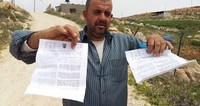
The Israeli Occupation Forces (IOF) issued on Sunday stop-construction orders of two Palestinian homes in al-Khalil and filmed other homes in Beit Ummar town north of al-Khalil to the south of the West Bank.
Local activist Mohamed Awad told a PIC reporter that Israeli forces stormed Sunday afternoon Beit Ummar town and delivered two stop-reconstruction orders against two local homes of two and three floors.
Several other neighboring homes were stormed and filmed during the raid, he added.
Local activist Mohamed Awad told a PIC reporter that Israeli forces stormed Sunday afternoon Beit Ummar town and delivered two stop-reconstruction orders against two local homes of two and three floors.
Several other neighboring homes were stormed and filmed during the raid, he added.
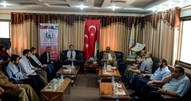
A delegation from the Turkish Diyanet Foundation, an affiliate of the Presidency of the Turkish Religious Affairs, arrived on Sunday in the Gaza Strip through Beit Hanoun (Erez) crossing.
During a reception held in Gaza City, head of the foundation Mustafa Tutkun said the delegation came to Gaza to check on the Turkey-funded projects for the reconstruction of mosques destroyed in the 2014 Israeli war.
Tutkun expressed his foundation's keenness on restoring the religious life in Gaza through rebuilding the destroyed mosques.
The Presidency of the Turkish Religious Affairs had announced last December plans to rebuild nine mosques destroyed by Israel during its 2014 war on the besieged enclave.
According to the Palestinian ministry of Waqf and religious affairs, the Israeli army destroyed 64 mosques completely and caused different levels of damage to 150 others during its last war on Gaza.
During a reception held in Gaza City, head of the foundation Mustafa Tutkun said the delegation came to Gaza to check on the Turkey-funded projects for the reconstruction of mosques destroyed in the 2014 Israeli war.
Tutkun expressed his foundation's keenness on restoring the religious life in Gaza through rebuilding the destroyed mosques.
The Presidency of the Turkish Religious Affairs had announced last December plans to rebuild nine mosques destroyed by Israel during its 2014 war on the besieged enclave.
According to the Palestinian ministry of Waqf and religious affairs, the Israeli army destroyed 64 mosques completely and caused different levels of damage to 150 others during its last war on Gaza.
1 june 2016
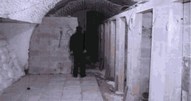
The Israeli Jerusalem municipality issued on Tuesday evening an order to stop the construction of bathrooms and ablution cells near Muslims’ the holy al-Aqsa Mosque, Q-Press Center said Wednesday.
The Israeli occupation municipality ruled for halting the construction of lavatories reportedly at the request of the Israeli Prime Minister Benjamin Netanyahu following an emergency meeting held in his office Tuesday afternoon.
According to Israeli sources, the Islamic Endowment Department in Occupied Jerusalem initiated the construction of dozens of toilets and ablution cells in al-Saraya building, near the al-Aqsa Mosque.
The stop-construction order also garnered the approval of the Israeli agriculture minister Uri Ariel.
Over recent days, Israeli media outlets sparked incitement against the Islamic Endowment Department and pushed for ceasing construction works.
Calls have meanwhile been launched by Israeli leaders and fanatic gangs to expand illegal settlement across Occupied Jerusalem and seize Muslims’ properties in favor of Judaization plans at and around the holy al-Aqsa Mosque—the third holiest site in Islam.
The Israeli occupation municipality ruled for halting the construction of lavatories reportedly at the request of the Israeli Prime Minister Benjamin Netanyahu following an emergency meeting held in his office Tuesday afternoon.
According to Israeli sources, the Islamic Endowment Department in Occupied Jerusalem initiated the construction of dozens of toilets and ablution cells in al-Saraya building, near the al-Aqsa Mosque.
The stop-construction order also garnered the approval of the Israeli agriculture minister Uri Ariel.
Over recent days, Israeli media outlets sparked incitement against the Islamic Endowment Department and pushed for ceasing construction works.
Calls have meanwhile been launched by Israeli leaders and fanatic gangs to expand illegal settlement across Occupied Jerusalem and seize Muslims’ properties in favor of Judaization plans at and around the holy al-Aqsa Mosque—the third holiest site in Islam.
10 may 2016
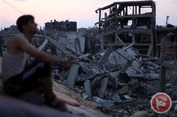
Some 8,500 families in the Gaza Strip are to receive assistance to reconstruct homes damaged or destroyed by Israel’s devastating assault on the besieged coastal enclave in 2014, according to UNRWA -- the UN Agency responsible for providing assistance to Palestinian refugees.
The $9.5 million relief fund is part of Germany’s contribution to UNRWA’s disbursement plan toward rebuilding shelters in the Gaza Strip, nearly two years after the war, from which up to 75,000 Palestinians remain homeless.
In press release published by Tuesday, UNRWA said the funds will begin disbursement to the eligible families with a week.
Germany has provided a total of $65.4 million toward the reconstruction effort and $91.7 million overall to UNRWA in 2015, the press release added.
Last week, in what was seen as an unusual escalation of violence since a ceasefire was brokered between Israel and Hamas in 2014, an Israeli air assault targeting the southern Gaza Strip for four consecutive days killed one Palestinian women and wounded several others.
The Gaza Strip has seen three wars with Israel since 2008, with Israel's 2014 offensive destroying 12,600 homes, and leaving another 6,500 severely damaged and 150,000 housing units uninhabitable.
Reconstruction efforts have been painfully slow -- hindered by Israel's blockade, ongoing disputes with the Fatah-dominated Palestinian Authority, and a severe shortage of foreign assistance.
UNRWA has played a leading role in rebuilding destroyed homes in the beleaguered coastal enclave, but said in April that of the $720 million required for its emergency shelter program, donor countries had pledged only $247 million.
The UN warned in September last year that if current trends were to continue unchanged in Gaza, the territory would be uninhabitable by 2020.
The $9.5 million relief fund is part of Germany’s contribution to UNRWA’s disbursement plan toward rebuilding shelters in the Gaza Strip, nearly two years after the war, from which up to 75,000 Palestinians remain homeless.
In press release published by Tuesday, UNRWA said the funds will begin disbursement to the eligible families with a week.
Germany has provided a total of $65.4 million toward the reconstruction effort and $91.7 million overall to UNRWA in 2015, the press release added.
Last week, in what was seen as an unusual escalation of violence since a ceasefire was brokered between Israel and Hamas in 2014, an Israeli air assault targeting the southern Gaza Strip for four consecutive days killed one Palestinian women and wounded several others.
The Gaza Strip has seen three wars with Israel since 2008, with Israel's 2014 offensive destroying 12,600 homes, and leaving another 6,500 severely damaged and 150,000 housing units uninhabitable.
Reconstruction efforts have been painfully slow -- hindered by Israel's blockade, ongoing disputes with the Fatah-dominated Palestinian Authority, and a severe shortage of foreign assistance.
UNRWA has played a leading role in rebuilding destroyed homes in the beleaguered coastal enclave, but said in April that of the $720 million required for its emergency shelter program, donor countries had pledged only $247 million.
The UN warned in September last year that if current trends were to continue unchanged in Gaza, the territory would be uninhabitable by 2020.
9 may 2016

Israeli Occupation Forces (IOF) on Sunday banned Palestinians from continuing work on a European-financed project opening a water channel for inhabitants of a hamlet east of Tubas in the northern Jordan Valley.
Local sources told the PIC reporter that the project aimed at providing the hamlet with water, since it has no water sources, by opening a 4.5-kilometer long channel.
The hamlet’s inhabitants, 256 individuals of 38 families, have been suffering from tough living conditions under which they have to use water tanks.
Local sources told the PIC reporter that the project aimed at providing the hamlet with water, since it has no water sources, by opening a 4.5-kilometer long channel.
The hamlet’s inhabitants, 256 individuals of 38 families, have been suffering from tough living conditions under which they have to use water tanks.
6 may 2016
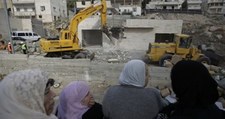
Israeli Occupation Forces (IOF) handed a stop of construction notice to the Palestinian Ayed al-Shawahin ordering him to stop the construction process of his home in Yatta town to the south of al-Khalil after storming the structure and confiscating some of the construction materials.
Coordinator of the popular committee against settlement in Yatta, Ratib al-Jabour, told Quds Press that the IOF claims lack of construction permits.
The house owner, however, applied for a permit years ago in vein, Jabour pointed out. Israeli demolition orders last year affected 645 homes and structures in the West Bank and Occupied Jerusalem. While, 780 demolition orders were handed over to Palestinians in the same year.
Coordinator of the popular committee against settlement in Yatta, Ratib al-Jabour, told Quds Press that the IOF claims lack of construction permits.
The house owner, however, applied for a permit years ago in vein, Jabour pointed out. Israeli demolition orders last year affected 645 homes and structures in the West Bank and Occupied Jerusalem. While, 780 demolition orders were handed over to Palestinians in the same year.
2 may 2016
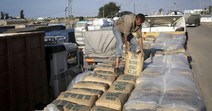
The Israeli occupation announced its intent to allow cement quantities into the blockaded Gaza Strip after a one month-ban, an Israeli newspaper reported on Sunday evening.
According to the Yedioth Aharonot newspaper cement truckloads are expected to enter into Gaza in the next few days so as to resume the reconstruction of civilian homes and structures destroyed by the 2014 Israeli offensive on the besieged enclave.
The newspaper quoted Israeli security sources as claiming that the one-month ban had nothing to do with the discovery of a tunnel in southern Gaza. The decision was reportedly made following calls repeatedly launched by Turkey to lift the Israeli siege on Gaza.
According to the Yedioth Aharonot newspaper cement truckloads are expected to enter into Gaza in the next few days so as to resume the reconstruction of civilian homes and structures destroyed by the 2014 Israeli offensive on the besieged enclave.
The newspaper quoted Israeli security sources as claiming that the one-month ban had nothing to do with the discovery of a tunnel in southern Gaza. The decision was reportedly made following calls repeatedly launched by Turkey to lift the Israeli siege on Gaza.
30 apr 2016

The National Anti-Siege and Reconstruction Movement Commission has warned that the suspension of UN reconstruction projects will worsen the humanitarian situation in the Gaza Strip, describing it as a serious development.
The UN Office for the Coordination of Humanitarian Affairs (OCHA) said a few days ago that its efforts to reconstruct the homes destroyed during the last Israeli war on Gaza had come to a halt because of Israel's refusal to allow in new cement shipments.
According to the commission, about 75 Palestinian citizens are still displaced and live in temporary places.
Over 40,000 citizens have also lost their livelihoods because of the failure to rebuild their workplaces.
The UN Office for the Coordination of Humanitarian Affairs (OCHA) said a few days ago that its efforts to reconstruct the homes destroyed during the last Israeli war on Gaza had come to a halt because of Israel's refusal to allow in new cement shipments.
According to the commission, about 75 Palestinian citizens are still displaced and live in temporary places.
Over 40,000 citizens have also lost their livelihoods because of the failure to rebuild their workplaces.
29 apr 2016

The Israeli ban on cement has obstructed the reconstruction of civilian homes in the blockaded Gaza Strip, the United Nations Office for the Coordination of Humanitarian Affairs (OCHA) reported Thursday.
According to OCHA, since 3 April 2016, the Israeli authorities have been preventing the import of cement into Gaza for the private sector, following allegations that a substantial amount had been diverted from its intended legitimate beneficiaries.
The controlled import of cement into Gaza for the private sector only resumed in October 2014 as part of the Gaza Reconstruction Mechanism (GRM), after a general sweeping ban imposed since the imposition of the blockade in June 2007, the statement added.
OCHA further quoted the Shelter Cluster as reporting that organizations providing assistance have had to suspend cash assistance for house repairs to over 1,370 families as a result of scarcity and acute price increases. In addition, payment to 1,550 families scheduled to start reconstruction are being delayed due to the lack of available cement.
Over 75,000 people whose homes were destroyed or severely damaged during the 2014 Israeli offensive continue to suffer from prolonged internal displacement due to access restrictions on basic construction materials and a lack of funding, the statement further read.
According to the Palestinian Contractors Union, the current shortage of cement is disrupting the jobs of 40,000 people working in the construction sector.
Much of Gaza remains in shambles since Israel’s war against the territory in the summer of 2014, which killed more than 2,500 people and wreaked huge destruction across the coastal enclave.
According to OCHA, since 3 April 2016, the Israeli authorities have been preventing the import of cement into Gaza for the private sector, following allegations that a substantial amount had been diverted from its intended legitimate beneficiaries.
The controlled import of cement into Gaza for the private sector only resumed in October 2014 as part of the Gaza Reconstruction Mechanism (GRM), after a general sweeping ban imposed since the imposition of the blockade in June 2007, the statement added.
OCHA further quoted the Shelter Cluster as reporting that organizations providing assistance have had to suspend cash assistance for house repairs to over 1,370 families as a result of scarcity and acute price increases. In addition, payment to 1,550 families scheduled to start reconstruction are being delayed due to the lack of available cement.
Over 75,000 people whose homes were destroyed or severely damaged during the 2014 Israeli offensive continue to suffer from prolonged internal displacement due to access restrictions on basic construction materials and a lack of funding, the statement further read.
According to the Palestinian Contractors Union, the current shortage of cement is disrupting the jobs of 40,000 people working in the construction sector.
Much of Gaza remains in shambles since Israel’s war against the territory in the summer of 2014, which killed more than 2,500 people and wreaked huge destruction across the coastal enclave.
26 apr 2016

Member of Hamas’s political bureau Mousa Abu Marzouk said Tuesday evening that the idea of establishing a seaport and an airport in Gaza Strip was not invented by Hamas Movement.
Gaza Strip had had an airport before being destroyed by Israeli occupation forces, he pointed out.
Establishing the seaport and airport will never separate Gaza from the West Bank, Abu Marzouk stressed, renewing his Movement's total rejection of any intention to establish an independent state in Gaza.
He also stressed his Movement's readiness to achieve a real national unity and reconciliation despite “Fatah’s obstacles.” Abu Marzouk concluded by saying that the seaport is a popular demand as it will alleviate the suffering of two million people living under a 10-year unfair siege.
Gaza Strip had had an airport before being destroyed by Israeli occupation forces, he pointed out.
Establishing the seaport and airport will never separate Gaza from the West Bank, Abu Marzouk stressed, renewing his Movement's total rejection of any intention to establish an independent state in Gaza.
He also stressed his Movement's readiness to achieve a real national unity and reconciliation despite “Fatah’s obstacles.” Abu Marzouk concluded by saying that the seaport is a popular demand as it will alleviate the suffering of two million people living under a 10-year unfair siege.
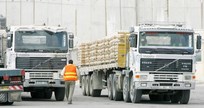
The contractors union in Gaza said that the Israeli occupation authority (IOA) would start to allow shipments of construction cement into the Strip early next week.
In press remarks to the Palestinian Information Center (PIC) on Monday, head of the union Osama Kahil stated that pledges were made in this regard following efforts made by the Palestinian ministry of civil affairs.
Kahil added that these cement shipments, which would be used for specific projects, were supposed to arrive in Gaza last week, but the IOA postponed their entry until next week.
He pointed out that Turkish, US, German and Qatari institutions recently received some truckloads of cement for their projects in the Strip.
However, the IOA has not decided yet to allow in cement for civilians, factories and merchants, according to him.
In press remarks to the Palestinian Information Center (PIC) on Monday, head of the union Osama Kahil stated that pledges were made in this regard following efforts made by the Palestinian ministry of civil affairs.
Kahil added that these cement shipments, which would be used for specific projects, were supposed to arrive in Gaza last week, but the IOA postponed their entry until next week.
He pointed out that Turkish, US, German and Qatari institutions recently received some truckloads of cement for their projects in the Strip.
However, the IOA has not decided yet to allow in cement for civilians, factories and merchants, according to him.
25 apr 2016
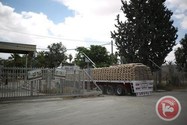
International organizations in the Gaza Strip received a cement delivery on Saturday, while a suspension on cement imports for the private sector was still being enforced by Israeli authorities.
Head of the Palestinian Contractors Union Osama Kahil told Ma’an that 2,000 tons of cement entered the Gaza Strip through the Kerem Shalom crossing on Saturday, and he expected further cement deliveries to enter in the coming week due to efforts by the Palestinian Ministry of Civil Affairs.
The shipments of cement would allow reconstruction efforts by international organizations to continue in the besieged coastal enclave, and return jobs to 40,000 construction workers who have been out of work since the last cement delivery, Kahil said.
Reconstruction efforts in the Gaza Strip have also been “expanded to include Turkish, German, and American plans in addition to the UN and Qatari plans of reconstruction,” Kahil added.
He assured efforts by the Palestinian Minister of Civil Affairs Hussein al-Sheikh were ongoing to continue the flow of cement through Kerem Shalom.
A spokesperson for Israel’s Coordination of Government Activities in the Territories (COGAT) told Ma’an that the suspension of construction materials entering the Gaza Strip was still being enforced due to “exploitation of construction materials by Hamas,” and that the ban would still be in place “until the issue is addressed.”
They added that the suspension only affected the private sector, and that entry for international projects was proceeding as usual.
Saturday’s delivery comes one week after it was revealed Israeli forces uncovered and destroyed a tunnel passing from the Gaza Strip into Israel, once a gag order by Israel’s government was lifted on its discovery.
The tunnel -- the first to be found since Israel's devastating military offensive on the coastal enclave in 2014 -- was reportedly discovered one week prior to the publication of the incident, around the time Israel suspended delivery of cement into the Gaza Strip.
Israeli authorities have previously accused the Gaza Strip's de facto ruling party Hamas of stealing reconstruction material to sell on the black market and use to build tunnels.
Reconstruction efforts following the the 50-day war have been painfully slow -- hindered by Israel's blockade, ongoing disputes between Gaza's de facto leaders Hamas and the Fatah-dominated PA, and a severe shortage of foreign assistance.
Head of the Palestinian Contractors Union Osama Kahil told Ma’an that 2,000 tons of cement entered the Gaza Strip through the Kerem Shalom crossing on Saturday, and he expected further cement deliveries to enter in the coming week due to efforts by the Palestinian Ministry of Civil Affairs.
The shipments of cement would allow reconstruction efforts by international organizations to continue in the besieged coastal enclave, and return jobs to 40,000 construction workers who have been out of work since the last cement delivery, Kahil said.
Reconstruction efforts in the Gaza Strip have also been “expanded to include Turkish, German, and American plans in addition to the UN and Qatari plans of reconstruction,” Kahil added.
He assured efforts by the Palestinian Minister of Civil Affairs Hussein al-Sheikh were ongoing to continue the flow of cement through Kerem Shalom.
A spokesperson for Israel’s Coordination of Government Activities in the Territories (COGAT) told Ma’an that the suspension of construction materials entering the Gaza Strip was still being enforced due to “exploitation of construction materials by Hamas,” and that the ban would still be in place “until the issue is addressed.”
They added that the suspension only affected the private sector, and that entry for international projects was proceeding as usual.
Saturday’s delivery comes one week after it was revealed Israeli forces uncovered and destroyed a tunnel passing from the Gaza Strip into Israel, once a gag order by Israel’s government was lifted on its discovery.
The tunnel -- the first to be found since Israel's devastating military offensive on the coastal enclave in 2014 -- was reportedly discovered one week prior to the publication of the incident, around the time Israel suspended delivery of cement into the Gaza Strip.
Israeli authorities have previously accused the Gaza Strip's de facto ruling party Hamas of stealing reconstruction material to sell on the black market and use to build tunnels.
Reconstruction efforts following the the 50-day war have been painfully slow -- hindered by Israel's blockade, ongoing disputes between Gaza's de facto leaders Hamas and the Fatah-dominated PA, and a severe shortage of foreign assistance.
